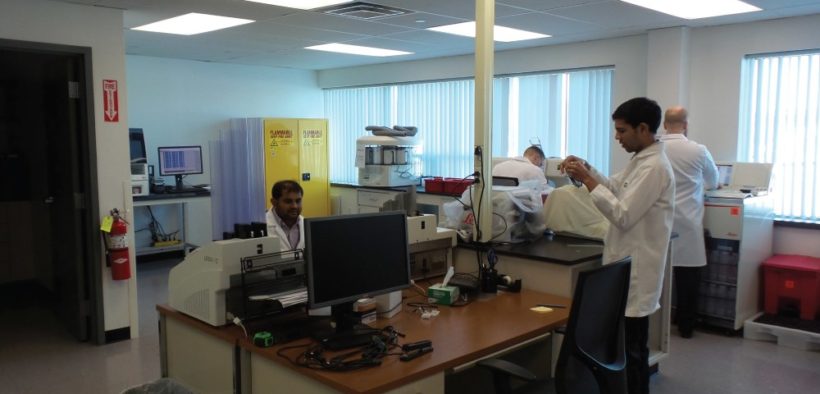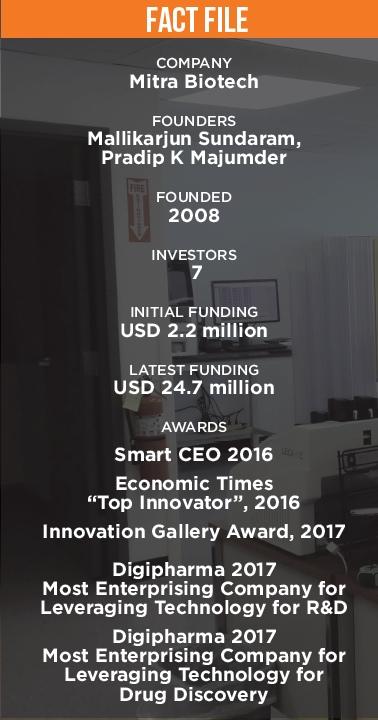PINPOINTING THE CURE

Mitra Biotech’s unique focus on analytics through CANScript helps doctors identify the right treatment for cancer patients
By Deepti Deepak Verma

To put together all the resources you can scrape together and relocate halfway across the globe, uprooting yourself from a cushy life in the US of A to a tiny apartment in one of Chennai’s quiet lanes that would serve as an office and a research laboratory… this requires resolve of an extraordinary kind. That is the kind of determination Mallikarjun Sundaram, president, cofounder and CEO of Mitra Biotech displayed in 2008.
Mitra Life Sciences, as it was known then, was born from Sundaram’s passion to fight cancer in an effective manner, coupled with the know-how and insight offered by co-founders Pradip K Majumder and Shiladitya Sengupta. Majumder, a cancer biologist, trained at prestigious institutes like the AIIMS, Dana Farber Cancer Institute, Harvard Medical School and Merck Research Lab. Sengupta teaches Engineering in Medicine at the Harvard Medical School.
The trio wanted to create a means to deliver effective and personalised cancer treatment; their idea—to use analytics as the tool that would customise cancer therapy—needed a lot of research. “We wanted to use all the money to build the product,” says Sundaram, in an online interview, of the half million dollars the company raised for setting up the research facility in India. In the 800-sq. ft apartment in Chennai, the kitchen was converted into a histopathology lab while one bedroom became a cancer biology lab and the other was turned into the boardroom.
“We knew the solution to solving a complex problem like cancer was in being unafraid of embracing the complex solution,” he says. “We did the initial work in India for two reasons; startup one, to create a very sound technology platform based on clinical data and two, to make it frugally so that the product thus formed is accessible to all.”
The company became Mitra Biotech in 2010 and the headquarters shifted to Bengaluru. The current Chairman of the board, Prof. Charles Cooney, is Professor Emeritus at MIT, and was a long-time director at Biocon, Genzyme, and Astra Zeneca.
The difficulty with cancer research is that the derivation of the disease and the way it progresses varies widely from patient to patient. This makes patients respond differently to each medication, making the oncologist’s decision-making process that much harder. As the other options to treat cancer, radiation and chemotherapy, often have damaging side-effects, the importance of delivering precision medication becomes all the more essential.
“We Work With Most Global Oncology Companies At Present, At Different Stages Of Their Development Pathway— Preclinical Stage, Clinical Stage As Well As The Postmarketing Stage.”
Mallikarjun Sundaram
(CEO, Mitra Biotech)

This is where Mitra Biotech comes to the doctor’s rescue. Its revolutionary product CANScript replicates the environment of the cancerous cell in the laboratory. A small slice of tumour tissue taken during a biopsy can be used for the test, along with 10ml of blood. Different drugs are then tested on this sample in an effort to gauge the patient’s response to them. CANScript assigns each drug, or combination of drugs, a numeric score called the M-score, depending on a number of parameters, including tumour cell death and rate of tumour growth. “CANscript can be thought of as a parallel machine that provides results for 4-8 drug options that the doctor might consider for his or her patient, all within one week,” explains Sundaram.
There are other technologies in place that help doctors look into a tumour. For instance, doctors can analyze the genetic structure of a cancer cell to look for the DNA modifications that have caused cancer. However, this approach works only on a tiny percentage of patients, claims Sundaram. Mitra Biotech also experimented with the human xenograft method in which cancerous cells from a human are injected into mice. But only 1 in 10 cancers develop into tumours in mice; even if it does, it takes around three months to develop a definite report.
CANScript, on the other hand, offers customized results in a week’s time, the option to test multiple drugs at a go, and is priced reasonably at around INR 40,000 per test. Mitra Biotech is already working with a few hospitals in Bengaluru and New Delhi. CANScript’s ability to test multiple drugs or formulations at a time also makes it a powerful tool for the pharmaceutical industry. “Less than 5 percent of drugs make it to the market from Phase 1 clinical trial stage,” says Sundaram. “Oncology drug development is a very expensive and long process, adding up to more than $2 billion and 10+ years for a drug to make the bench-to-bed transition. Lack of a suitable predictive model has been a huge hindrance so far for the industry. We work with most global oncology companies at present, at different stages of their development pathway— preclinical stage, clinical stage as well as the post-marketing stage.”
The company’s vision, in Sundaram’s words, is to become the global leader in cancer therapy selection. And the investors seem to be putting their faith in this vision. Two years ago, the start-up raised $27.4 million in Series B funding led by Sequoia India and Sands Capital Ventures. The company’s other investors include Tata Capital Innovations Fund, Accel Partners and RA Capital. “We as well as our investors see Mitra as a company that will be a financial blockbuster as well as a socially responsible company,” says Sundaram. “If we are successful in our deliverables over the next 2-3 years, we will not only become one of the most successful technology companies of the world with a diagnostic application but also play a fundamental role in how oncology drugs are developed. We attempt to remove the inefficiency in the system so that drug development becomes faster and cheaper, with the end result being that more drugs are available for patient care at a more affordable price.” Sundaram’s first brush with cancer was in 1986 when one of his brothers was diagnosed with the disease. Over 30 years later, he stands poised at the edge of providing timely and effective treatment to millions battling cancer
















